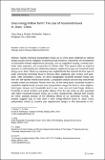Does energy follow form? The case of household travel in Jinan, China
Author(s)
Jiang, Yang; He, Dongquan; Mao, Qizhi; Zegras, P. Christopher
DownloadZegras Jiang et al_energy follow form.pdf (795.5Kb)
OPEN_ACCESS_POLICY
Open Access Policy
Creative Commons Attribution-Noncommercial-Share Alike
Terms of use
Metadata
Show full item recordAbstract
Rapidly increasing transportation energy use in China poses challenges to national energy security and the mitigation of greenhouse gas emissions. Meanwhile, the development of automobile oriented neighborhood structures, such as superblock housing, currently dominates urban expansion, and construction in Chinese cities. This research takes an empirical approach to understanding the relationship between neighborhood type and household travel energy use in Jinan, China, by examining nine neighborhoods that represent the four types of urban community commonly found in Chinese cities: traditional, grid, enclave, and superblock. After conducting a survey, we derive disaggregate household transport energy uses from the’ self-reported weekly travel diaries. Comparative analysis and two-step instrumental variable models are employed. Results show that, all else being equal, households located in superblock neighborhoods consume more transportation energy than those in other neighborhood types, because such households tend to own more cars and travel longer distances. Proximity to transit corridors and greater distance from the city center are also associated with higher household transport energy use in these neighborhoods, although both impacts are minor, partially because of the offsetting effects of car ownership. Overall, the analysis suggests that, to help chart a more energy-efficient future in urban China, policymakers should (1) examine past neighborhood designs to find alternatives to the superblock, (2) focus on strategic infill development, (3) encourage greater use of bicycles and e-bikes as a substitute for larger motorized vehicles, (4) improve the efficiency of public transportation, and (5) consider ways to shape citizens’ preferences for more energy-efficient modes of travel.
Date issued
2014-11Department
Massachusetts Institute of Technology. Department of Urban Studies and PlanningJournal
Mitigation and Adaptation Strategies for Global Change
Publisher
Springer-Verlag
Citation
Jiang, Yang, Pericles Christopher Zegras, Dongquan He, and Qizhi Mao. “Does Energy Follow Form? The Case of Household Travel in Jinan, China.” Mitigation and Adaptation Strategies for Global Change 20, no. 5 (November 6, 2014): 701–718.
Version: Author's final manuscript
ISSN
1381-2386
1573-1596